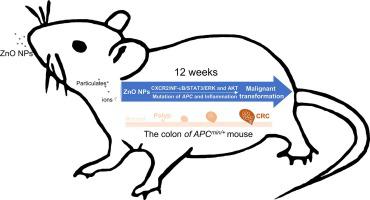Environment International ( IF 10.3 ) Pub Date : 2021-10-08 , DOI: 10.1016/j.envint.2021.106923 Jian Meng 1 , Juan Yang 2 , Ting Pan 2 , Xianjun Qu 3 , Shuxiang Cui 2

|
As the use of zinc oxide nanoparticles (ZnO NPs) in everyday products grows, so does concern about health risks. However, no findings on the gastrointestinal toxicity of ZnO NPs have been published. We investigated the possible malignant transformation of ZnO NPs in the mice’s colonic tissues using the APCmin/+ mouse model with a premalignant lesion in intestinal epithelial cells. Higher doses and long-term oral exposure to ZnO NPs were found to mildly promote colonic inflammation in WT mice, while they moderately or strongly exacerbated the severity of chronic inflammation and tumorigenesis in APCmin/+ mice with intestinal adenomatous polyposis. The ZnO NPs-induced inflammation and tumorigenesis in colonic epithelial cells was linked to the activation of CXCR2/NF-κB/STAT3/ERK and AKT pathways. Analysis of the ZnO NPs-exacerbated intestinal adenomatous polyposis in APCmin/+ mice revealed that ZnO NPs could activate the APC-driven Wnt/β-catenin signaling pathway, exacerbating intestinal tumorigenesis. In fact, ZnO NPs have been shown to increase intestinal inflammation and tumorigenesis in APCmin/+ mice by releasing free Zn2+. In WT mice, a low dose of ZnO NPs (26 mg/kg/day) did not cause intestinal inflammation. In conclusion, higher doses and prolonged exposure to ZnO NPs promote the malignant transformation of precancerous epithelial cells.
中文翻译:

ZnO纳米粒促进APCmin/+小鼠结直肠上皮细胞恶变
随着氧化锌纳米粒子 (ZnO NPs) 在日常产品中的使用越来越多,人们对健康风险的担忧也越来越多。然而,尚未发表关于 ZnO NPs 的胃肠道毒性的研究结果。我们使用具有肠上皮细胞癌前病变的APC min/+小鼠模型研究了 ZnO NPs 在小鼠结肠组织中可能发生的恶性转化。发现较高剂量和长期口服暴露于 ZnO NPs 轻度促进 WT 小鼠的结肠炎症,而它们中度或强烈加剧APC min/+中慢性炎症和肿瘤发生的严重程度患有肠腺瘤性息肉病的小鼠。ZnO NPs 诱导的结肠上皮细胞炎症和肿瘤发生与 CXCR2/NF-κB/STAT3/ERK 和 AKT 通路的激活有关。对 ZnO NPs 加重APC min/+小鼠肠腺瘤性息肉病的分析表明,ZnO NPs 可以激活APC驱动的 Wnt/β-catenin 信号通路,加剧肠道肿瘤发生。事实上,ZnO NPs 已被证明通过释放游离 Zn 2+来增加APC min/+小鼠的肠道炎症和肿瘤发生. 在 WT 小鼠中,低剂量的 ZnO NP(26 mg/kg/天)不会引起肠道炎症。总之,较高剂量和长时间暴露于 ZnO NPs 会促进癌前上皮细胞的恶性转化。











































 京公网安备 11010802027423号
京公网安备 11010802027423号